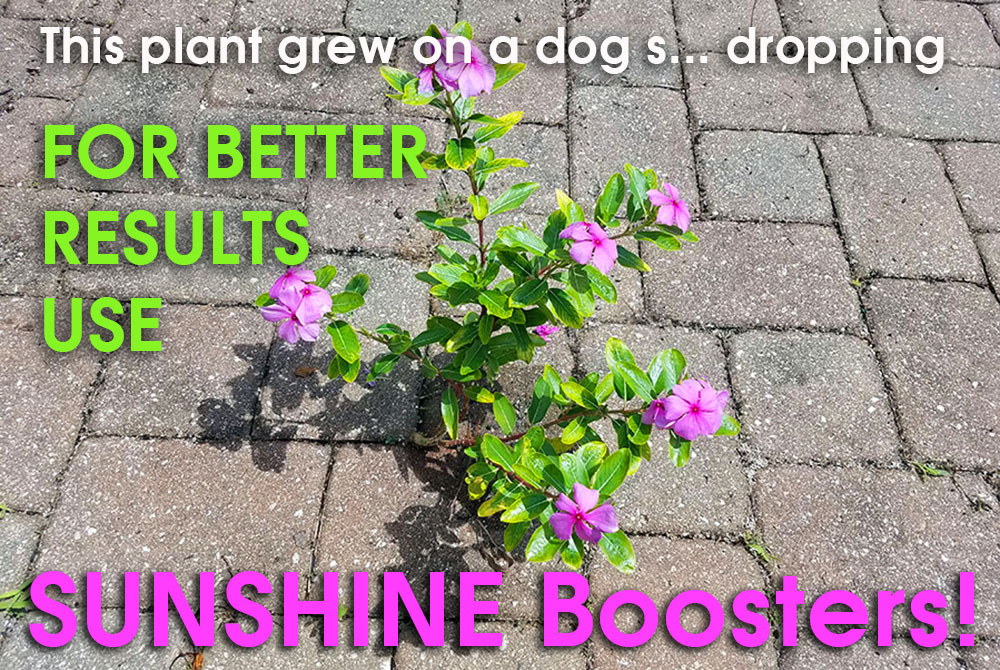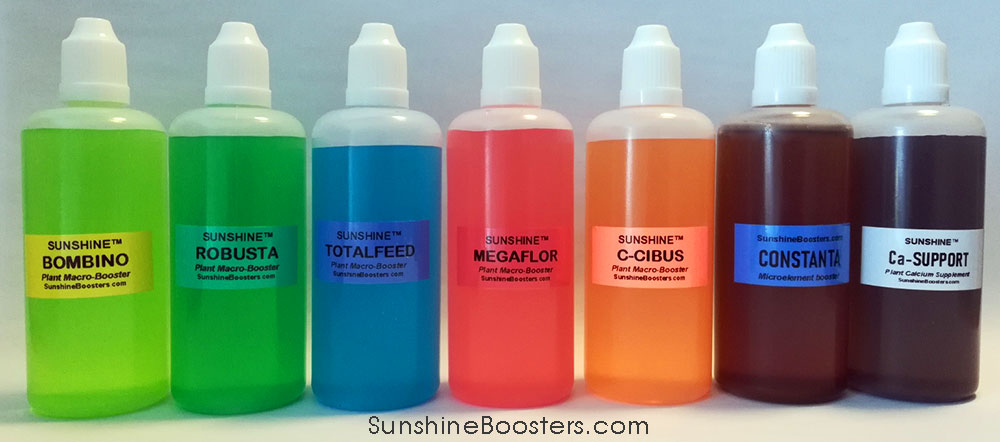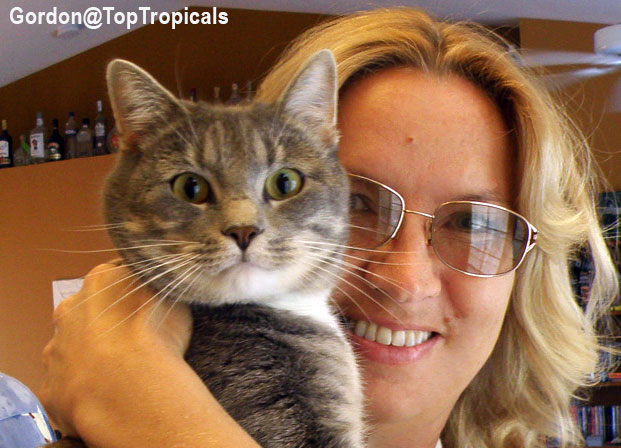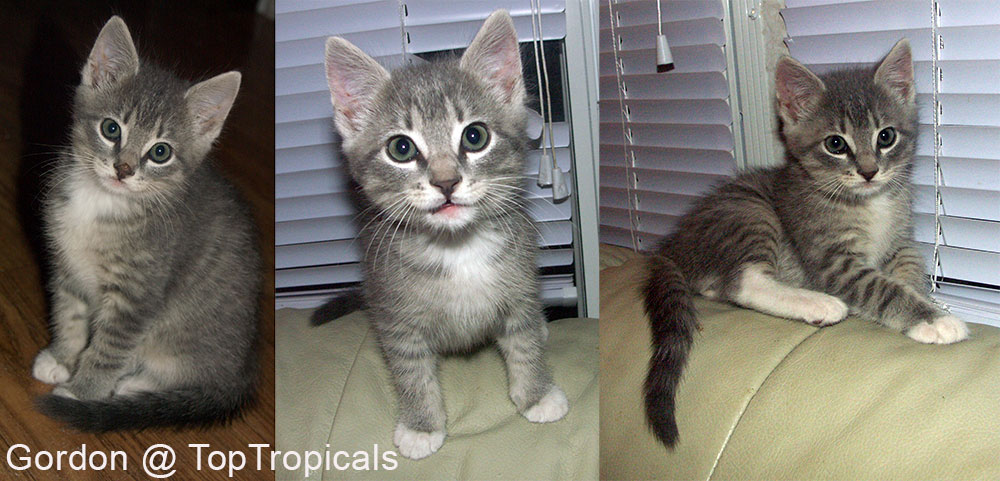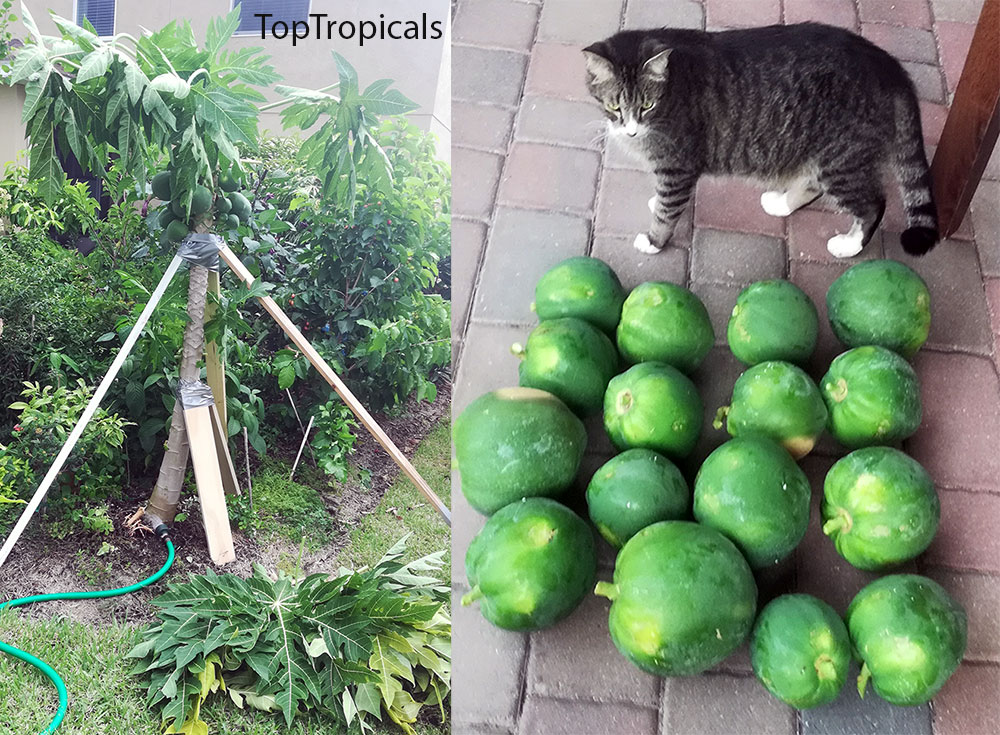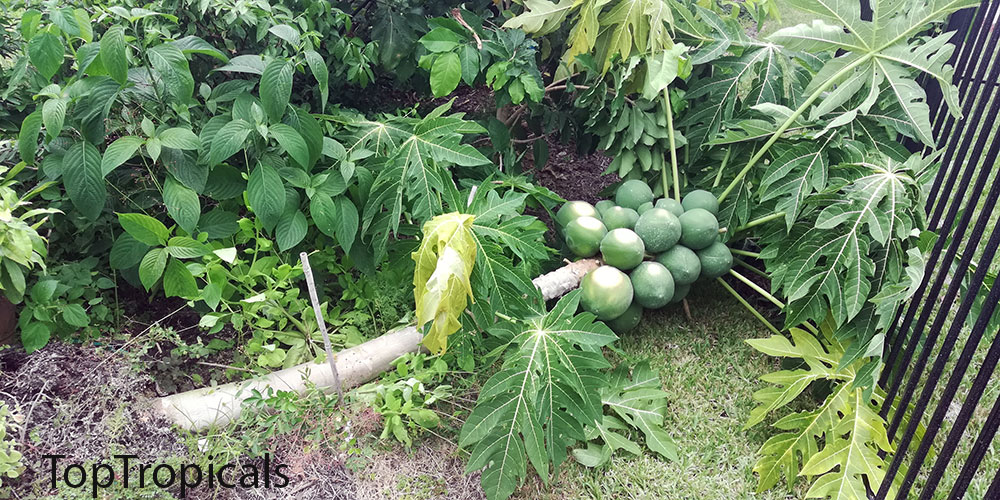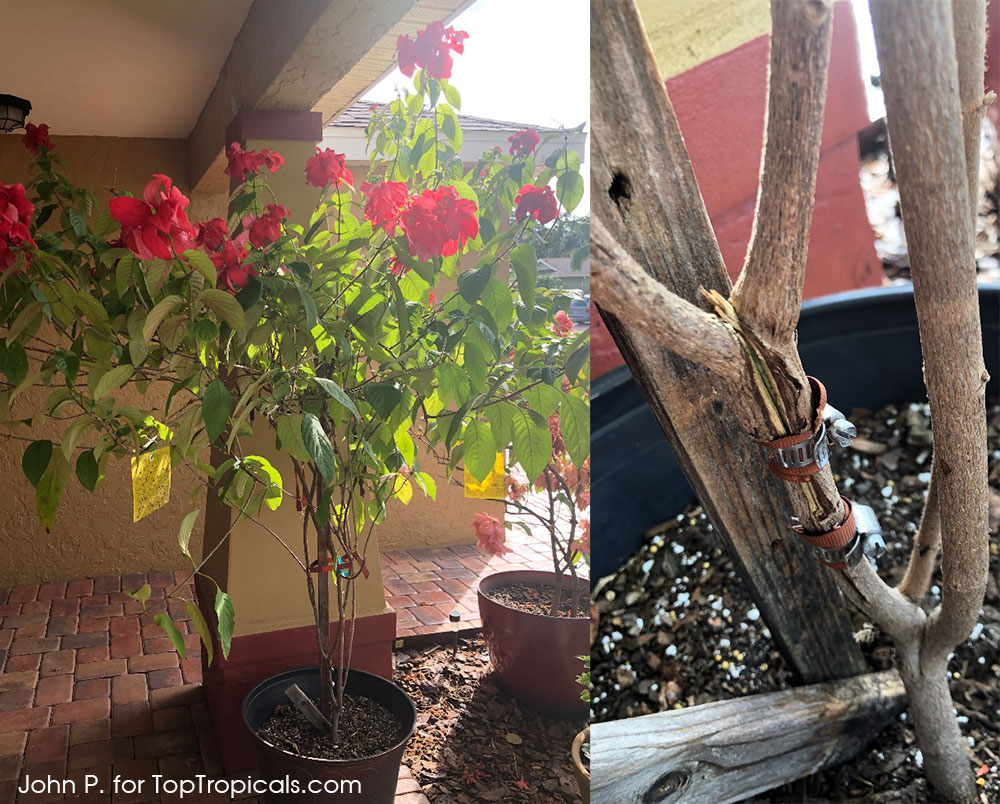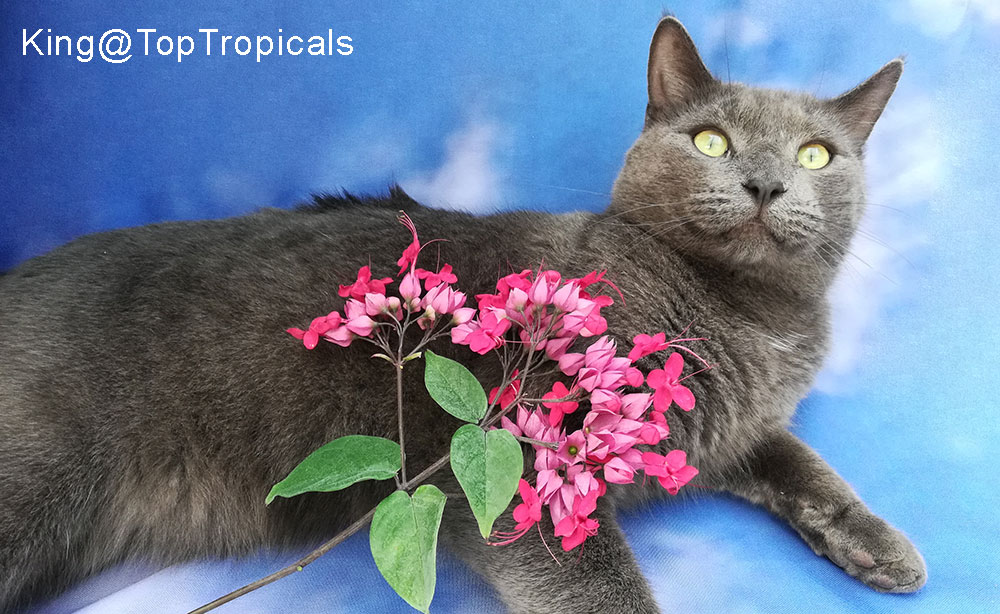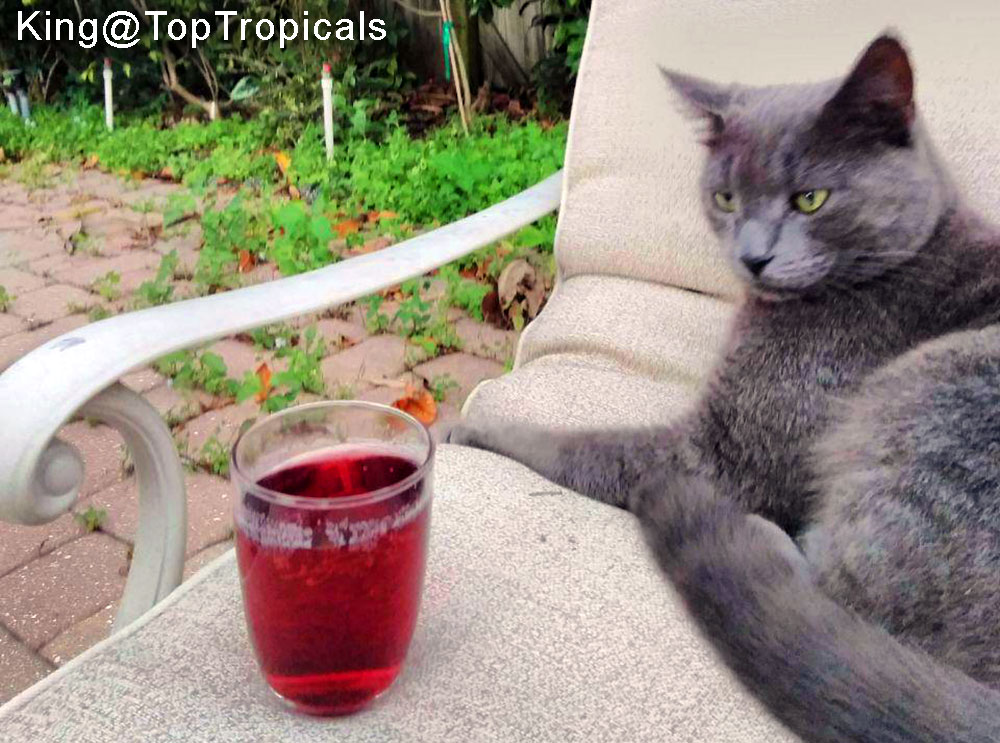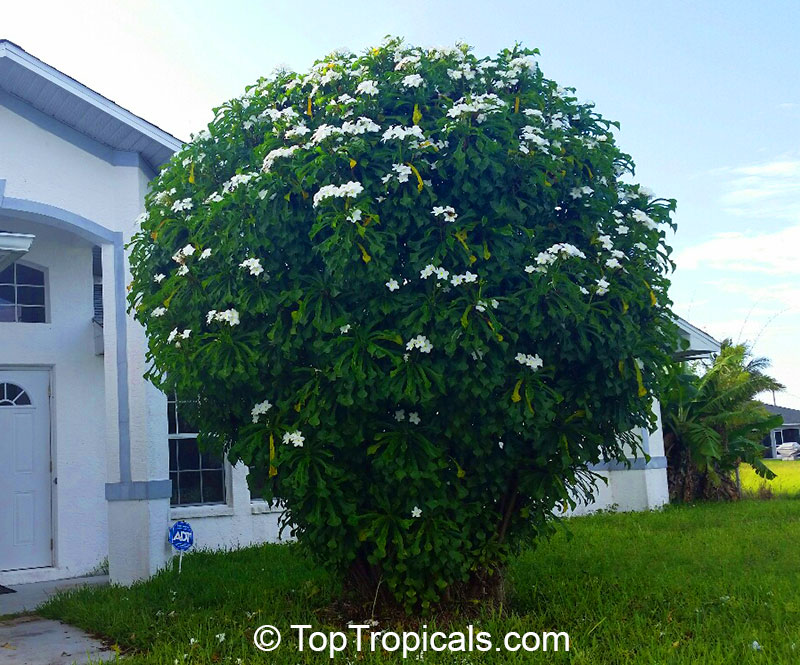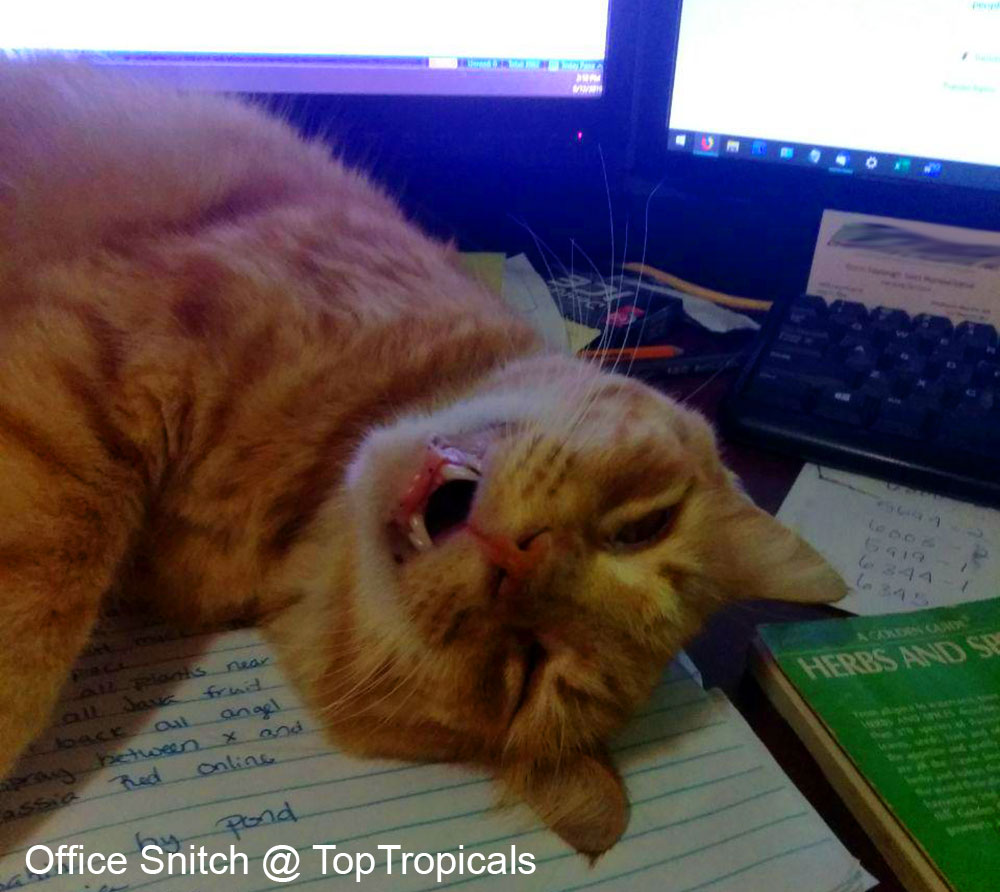Garden Blog - Top Tropicals
Date:
When to apply super boost?
Sunshine Boosters: a breakthrough in Winter fertilizing
In the photo: plants are tough survivors. Life can't be stopped even by a brick road!
Q: Just wanted to know best time of day to apply super boost as spray and watering? Only listed to make sure night temp doesn't drop below 65F...
A: As a rule of thumb, plant's needs in fertilizers are very low
in the cold season because they consume less nutrients during dormancy. For
tropical plants, when minimum temperatures drop below 65F - we stop
applications of dry (granulated) fertilizers until spring, to avoid root burn.
Liquid Sunshine Boosters are exceptions from this rule to a certain extent,
for 2 reasons:
- they are amino-acid based which means, salts do not build up in the soil,
and thus will not burn the roots even with slower plant metabolism.
- concentrations/formulas are mild and designed for as frequent as daily
watering
1) When a plant goes into full dormancy (drops leaves and does not show any new growth), you may stop fertilizing with any Macro NPK products (both dry and liquid)
2) If a plant is evergreen and continues growing during the cooler
period, and especially if it is a winter bloomer, mild liquid fertilizers can be
applied, depending on the stage of plant development.
Robusta and TotalFeed are used for vegetative growth and pre-flower.
Megaflor and C-Cibus are used for winter flowering/ fruiting plants during the bloom
stage.
See full list of liquid boosters
3) Micro-elements can be used all year round for all plants that are not dormant (do not drop leaves)
4) Always use Sunshine-Epi as a foliar spray to activate immune system and unlock protective mechanisms, BEFORE applying other boosters. It is especially important during Fall-Winter for improving cold tolerance and disease resistance.
5) Always apply foliar spray and/or drench the soil with solutions in morning hours so the plant has time to process the nutrients during daylight when metabolism is the most active.
6) Avoid any dry fertilizers during winter
Date:
Meet PeopleCats of TopTropicals. Gordon Freeman: the Veteran, son of the Veteran
Gordon Freeman is one of the oldest cats, a True Veteran, and a Son of the Veteran. He was born at our old location back in Punta Gorda on November 11, 2008, when our son Alex just came back from Iraq, where he was on a military mission. So Gordon adopted him! Along with Alex, Gordon Freeman is taking care of our Country security, and is an active supporter of our Troops. This Veterans Day, his daddy Alex is again on a mission overseas, protecting our Freedom. Gordon Freeman is waiting for him to come back soon.
Our prayers are with our Soldiers. Stay safe and sound, and get back home soon!
Happy Birthday, Gordon! Happy Veterans Day!
Check out and more Cat of the Day stories.
Gordon 2008
Gordon today
Date:
Saving Fallen Papaya Tree
Q: Hope there is help for my beautiful amazing papaya tree! There where a loooooooot of fruits on it, but it broke! First of all, it was leaning and friends tried to straight my beautiful tree. What can I do? Will it get fruits again?
A: A couple months ago we also had a Papaya tree loaded with
fruit that fell down (see photos). It was heart-breaking. We secured it and it
continued growing for a couple of weeks but unfortunately, at the end the tree
still died, leaving us a million fruit.
The Papaya tree has a very sensitive root system and is hard to
re-establish once the roots are damaged.
However, if it just has a broken top, it has a good chance to grow back
from the side shoots.
Of course, remove all the fruit so they don't take energy from the
recovering tree.
When a tree is loaded with fruit, it is important to provide support for
heavy branches and for the trunk if needed. Always support the fruiting tree to
prevent from possible falling BEFORE it starts leaning down and may become
broken by even a light wind.
In the photo, you can see how we fixed boards around, but it was already
after the tree fell. Unfortunately, it was too late since the roots got
damaged. Always need to stake the tree up before the branches get too heavy!
RECOMMENDED FERTILIZERS:
Fruit Festival Plant Food - Super Crop Booster
Mango-Food - Smart Release Fruit Tree Booster
SUNSHINE-Honey - sugar booster
Only local pick up from our
Garden Center
Hurry up, while supply lasts!
Date:
Meet PeopleCats of TopTropicals. Mommy Moe, meep-meep!
Moe is the oldest of the indoor PeopleCats. She came to us six years
ago. She is a Siberian, these are sold as hypoallergenic cats... Unfortunately
for Moe's previous owner, she is not hypoallergenic! Lucky for us she is a
purrrrfect fit.
Moe is the mommy cat to all others. She takes all new People under her wing
and shows them around. She is a very sweet purrrson, and very smart. She
loves turning lights off on you and playing fetch with her toy mouse. Siberian
cats have a very unique meow. It is actually more of a "meep-meep", there is
no eowww part!
Check out and more Cat of the Day stories.
Keeping us clean and happy!
Moe raising Bagheera and Mowgli
Date:
Trimming Mussaenda bush
Q: My wife and I bought a Dona Evangelina from you this year. It thriving and has grown to 6-8 ft. It has become top-heavy and in wind, it falls over. Main stems have split twice but still continues to grow. I usually prune Dona Luz back to 3-4 ft and am wondering how much you would advise me to lop off your plant. Any advise will be appreciated.
A: Mussaendas, indeed, have very fragile stems that break often,
especially in Florida wind storms. The good news is, these plants grow
vigorously once established.
You did a good job trying to tie together the split stems and in fact,
cracks do grow back together as long as the dressing is tight. Try to use green
tape or even electric tape to tighten the broken spot.
However, do such repairs only if it is critical for a plant. When possible,
simply cut off the broken branch and give the plant a chance to grow a new
stronger branch. You may trim the bush pretty short. Mussaendas respond well
to pruning which promotes more side growth and makes the plant bushier.
Keep in mind that during cold weather, Mussaenda may drop all leaves and go
into dormancy until spring.
RECOMMENDED FERTILIZERS:
Pink N Good Daily Plant Food - Flower Booster
Tropical Allure - Smart-Release Booster
Date:
Meet PeopleCats of TopTropicals. King: the King of the Nursery
King runs the nursery... when Duck Dobi has a day off. So technically, he is only an Assistant Manager.
As you remember, a few months ago King got in trouble protecting his property from invaders, and got a serious injury. He was rushed to the hospital and had a big surgery. The King was saved! Many customers reached out with help, placed orders for our special "Save the King" fundraiser and even sent donations to help him manage his medical bills. We want to thank you all again for your support, and for staying with us!
King will make sure his Homeland Security is always alert. We are safe here. Welcome to TopTropicals!
Check out and more Cat of the Day stories.
It's been a hard day's night... and I've been working like a
dog!
Have I deserved my drink?
King and Dobi figuring out who is the Boss. Dobi knows who.
Date:
Hardy Plumeria Pudica
Q: I have ordered plumeria pudica from you in March and it is thriving really well here in Rancho Cordova, California. The current temperatures are ranging from 68 to 32 degrees Fahrenheit. My USDA zone is 9b. Does this plumeria pudica survive outside with temperatures dropping in coming winter in CA?
A: From our experience, Plumeria pudica is pretty cold hardy and takes some cold spells in
spite of being a tropical species.
Our trees (well-established) took a few hours of freeze with no
significant damage.
Potted plants are less hardy than in-ground plants. However, their
advantage is, they are easy to move indoors or inside warmer place like garage,
etc. If the temperature stays borderline around 32F for a few hours, the plant
should be safe as long as warm day temperatures follow a cold night. For
longer periods of cold, move the plant inside.
Make sure do not overwater and keep Plumeria on a dry side during
winter, since cold and wet is a bad combination and may cause root problems.
Above is the picture of Plumeria pudica tree growing in Cape Coral, FL
where low temperatures in winter sometimes go down to upper 20's for a few
hours.
To improve cold hardiness of Plumerias and other tropical plants, use SUNSHINE-Epi-T for plant thermal protection and immune system boost.
Make sure to fertilize plants on regular basis to keep them strong and
vigorous. The stronger and bigger the plant, the hardier it is!
RECOMMENDED FERTILIZERS:
Plumeria Top Dress - Smart-Release Booster
Pink N Good Daily Plant Food - Flower Booster
Tropical Allure - Smart-Release Booster
Date:
Meet PeopleCats of TopTropicals. Fearless Mr Barcy, the Boss
Mr Barcy is the Boss. He owns the property, the street, the
neighborhood, and the City of Ft Myers. Once he told us that he owns the whole State of
Florida too but he won't go any further... for political reasons he preferred
not to disclose.
Along with Chief, Mr Barcy is one of the oldest cats of TopTropicals.
His story is, some 10 years ago, he was sitting in Animal Control shelter
in Sebring, FL with no one wanting to adopt him... His "time" expired and he
was supposed to be put down on Friday... Someone sent us his picture in a
shelter cage and... on Wednesday, we picked him up (along with a few other
"scheduled" cats). Since then, Mr Barcy has been living with us, running the
business, and being the smartest Purrrson we ever met.
As a Boss, Mr Barcy has his own GPS tracker - and he walks 3-4 miles every
day (not bad for a senior purrson ah?) around his premises, keeping
operations under control, and himself in great shape.
In his leisure time, Mr Barcy prefers mice- and snake- hunting, keeping the
neighborhood safe and monitored. He can walk a human without using a leash,
and his tail is ALWAYS up!
Check out and more Cat of the Day stories.
Mr Barcy planning his business day
Don't interrupt my snake-snacking!
Date:
Fragrant Gold Leaf Orchid Vine
By Onika Amell, tropical plant specialist
Q: I am absolutely thrilled to see you have this vine. I've tried for years to get this plant! It is so, so rare. It just seemed impossible to find in this country. How do I make it thrive? I am ordering two.
A: We are happy to confirm that indeed we do have this rare vine!
Bauhinia aureifolia - Gold Leaf Orchid Vine - was discovered in Thailand in
1983. It is endemic to Pattani, Narathiwat, and Yala in Southern Thailand.
Danish botanist Kai Larsen named this plant and hailed it as one of the rarest
plant species of the world when it was discovered in the eighties.
The Thai people call this vine Bai Mai Si Thong. It is a beautiful
climber with large, bi-loped leaves (7 inches or more!) and good branching.
Young leaves are a stunning burnt orange to terracotta color for about
a week and as they reach full size, they turn green over a couple of days.
This is a very rare color for Bauhinia. It produces leaves all the time and
this means this vine is always full of beautiful color. With its golden leaves,
it sure is reminiscent of Autumn.
This vine blooms from May to November. It bears bunches of small
flowers that are delicately fragrant in the evenings. The cultivated plants range
flower color from pure white to purple and pink, while the wild ones have
often white petals with pinkish patches.
Bauhinia aureifolia needs well-drained soil, full light and good humidity
to thrive. It will tolerate a light freeze once established and it is very
important to protect young plants.
Gold Leaf Orchid Vine also makes a wonderful container plant with staking
or support. It is a must for every rare plant collection!
RECOMMENDED FERTILIZERS:
Pink N Good Daily Plant Food - Flower Booster
Tropical Allure - Smart-Release Booster
Date:
Meet PeopleCats of TopTropicals. Office Snitch
Snitch is an office employee. He is Kristi's personal assistance and he owns half of her desk (well, the middle half). He is helping answering customer calls and messages.
When you visit our Garden Center, be careful when you open the office door and step in - Snitch might be playing a Doormat!
Snitch dozed off after his office hard work
Inspecting the Grounds and Above with Dobi Duck
Snitch when he was young (2017)
